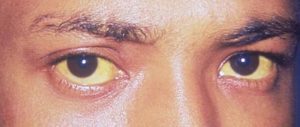Human life is truly a box of surprises; even when everything seems 100%, if you look closely, you may find some problem. One of these life “surprises,” which can be discovered by chance, is Gilbert syndrome.
What is Gilbert Syndrome?
Gilbert Syndrome is a hereditary condition also known as constitutional hepatic dysfunction, and is, in most cases, discovered accidentally, such as during a simple routine blood test where bilirubin levels are found to be highly elevated. The syndrome affects both sexes, but studies show that most cases are related to males. Gilbert syndrome usually appears at the end of adolescence or around 20 years of age and often occurs in those with a family history or, more specifically, due to hereditary problems. Even though it’s more common at this stage, Gilbert syndrome can occur at any age and at any phase of human life. Many people may live for years without suspecting they have the syndrome. The main characteristic of the disease is jaundice, which causes the skin and eyes to become very yellow. It is not a serious disease and does not pose a life risk, so there’s no need to panic. Gilbert syndrome is not contagious and therefore does not pose a risk to those nearby. 
Symptoms of Gilbert Syndrome
Gilbert syndrome is considered silent and usually does not present symptoms except for yellowing of the skin and eyes caused by jaundice. However, patients with the syndrome have shown recurring symptoms such as:
- Fatigue
- Severe headache
- Nausea
- Diarrhea
- Constipation
It is still unclear whether these symptoms are linked to bilirubin levels, but they are temporary and can be easily managed with simple care. For women with the syndrome, it has been observed that bilirubin levels may increase due to heavy menstruation, which worsens jaundice, making the skin even more yellow.
Treatment for Gilbert Syndrome
Gilbert syndrome is a very harmless condition, so there is no specific treatment or cure. However, some medications that are metabolized by the liver should be avoided by people with the syndrome, to minimize further strain on the organ. Another important recommendation for patients with Gilbert syndrome is to avoid alcohol consumption, as it can cause irreversible damage to the liver and increase the risk of more serious illnesses.
Causes of Gilbert Syndrome
Gilbert syndrome can be triggered by several factors, including: heavy menstrual periods, high levels of stress, fasting, episodes of dehydration, and even excessive exercise without professional guidance. However, its main cause is heredity due to an abnormal gene. This gene controls the enzyme that breaks down and regulates bilirubin in the liver. When this function is impaired, bilirubin builds up in the blood, causing the yellowing of the skin and eyes and showing irregularities in complete blood tests. People with Gilbert syndrome have about 30% of the normal amount of the enzyme bilirubin UGT working in their body; as this substance is toxic and accumulates in the body, it causes elevated bilirubin levels. See Also: Yellow Fever: Main Symptoms and Treatments Photo: Jaundice_eye











